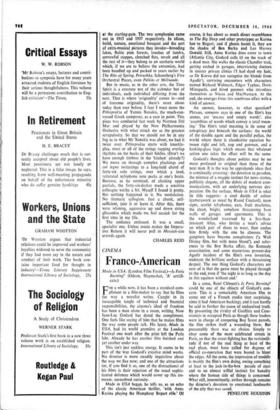CINEMA
Franco-American
OR a while now, it has been a standard com- r pliment to a film-maker to say that he films the way a novelist writes. Caught in its inescapable tangle of technical and financial responsibilities, the cinema's ideal of freedom has been a man alone in a room, writing. Now Jean-Luc Godard has dated the compliment. One feels like saying of him that he makes films the way some people talk. His latest, Made in USA, had its world premiere at the London Festival one week after the print left the Paris labs. Already he has another film finished and yet another under way.
This isn't just reckless energy. It seems to be part of the way Godard's creative mind works. No director is more steadily inquisitive about the way we live now; and one of the attractions (or, if you find it so, one of the distractions) of his films is their rejection of the usual sophis- ticated defences which would cover up this im- mense, unresolved curiosity.
Made in USA began, he tells us, as an echo of the classic American thriller, 'with Anna Karina playing the Humphrey Bogart role.' Of course, it has about as much direct resemblance to The Big Sleep and other prototypes as Karina has to Bogart; and if ghosts haunt it, they are the shades of Ben Barka and Lee Harvey Oswald. Still, Anna Karina does come to town (Atlantic City, Godard calls it) on the track of a dead man. She walks the classic Chandler trail, getting coshed in garages, interviewing doctors in sinister private clinics CI had dyed my hair, so Dr Korvo did not recognise the blonde from Agadir"), surviving encounters with characters named Richard Widmark, Edgar Typhus, Doris Mizoguchi, and hired gunmen who introduce themselves as Nixon and MacNamara. At the end, she emerges from this tenebrous affair with a kind of answer.
An answer, however, to what question? Phrases, someone says in one of the film's key scenes, are `useess and empty words'; also `assemblies of words which convey a total mean- ing.' The film's total meaning is its sense of conspiracy just beneath the surface: the world of the double agent and the parallel police, the world where there is clandestine equation be- tween right and left, cop and gunman, and a looking-glass logic which means that whatever action one takes the effect will be the same.
Godard's thoughts about politics may be no more profound or original than those of the next man. It is the way he apprehends ideas that is continually arresting: the devotion to paradox, the mixture of a magpie instinct for news stories, publicity slogans, all the debris of modern com- munications, with an underlying nervous des- peration. On the surface, Made in USA is what its title suggests: a cool dazzle of colour (camerawork as usual by Raoul Coutard), neon signs, scarlet telephones, cars, fruit machines, the clean, bright, somehow threatening bare walls of garages and apartments. This is the wonderland traversed by a less-than- innocent Alice, who invites a man's advice on which pair of shoes to wear, then coshes him firmly with the one he chooses. The gangsters have become conspirators Ca Walt Disney film, but with more blood'), and refer- ences to the Ben Barka affair, the Kennedy assassination, and some mysterious present-day Agadir incident of the film's own invention, undercut the brilliant surface with a threatening despair. The one thing Godard's characters are sure of is that the game must be played through to the end, even if 'the night is as long as the day in this equinox without end.'
In a sense, Rene Clement's Is Paris Burning? could be one of the objects of Godard's con- cern. This is a remarkably American film to come out of a French studio (not surprising, since it had American backing), and it can hardly be said to further the cause of undeceived truth. By presenting the rivalry of Gaullists and Com- munists in occupied Paris as though these leaders were in charge of competing Boy Scout patrols, the film strikes itself a wounding blow. But presumably there was no choice. Simply to clear some of the most celebrated streets in Paris, so that the street fighting has the verisimili- tude if not of the real thing at least of the real place, must have called for degrees of official co-operation that were bound to blunt the edges. All the same, the impression of muddle is mainly the film's own doing, owing something at least to the jack-in-the-box parade of stars and to an almost wilful instinct for banality where the human side of things is concerned. What still, intermittently, strikes through remains the director's devotion to emotional landmarks of the city that was saved.
PENELOPE HOUSTON






























 Previous page
Previous page